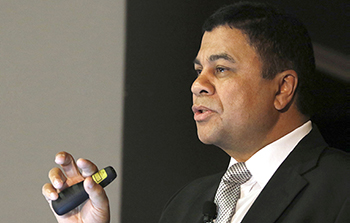
Newly appointed Vice-Chancellor and Rector of the
University of the Free State, Prof Francis Petersen during
the first-year welcoming.
Photo: Charl Devenish
“How do you like my new blazer? Do you think these stripes suit me?” These were the words of the newly appointed Vice-Chancellor and Rector of the University of the Free State, Prof Francis Petersen, as he took to the stage in his #ProudlyKovsies blazer to welcome the 2017 first-years to the Kovsie family.
The event, which was also the start of the first-year Gateway Programme, took place on Saturday, 21 January 2017, and saw first-years and their parents make their way to the Red Square on the Bloemfontein Campus where they were formally welcomed.
UFS to produce world graduates
As newcomers, Prof Petersen wanted the fresh faces to feel welcome, to feel a sense of belonging. “You are now a Kovsie, and we want you to experience that Kovsie life until you graduate,” he told them.
During his speech, Prof Petersen reassured parents that the academic year would be completed and that the UFS would operate as an institution. He encouraged the students to absorb and gain knowledge and said the university would strive to ensure excellent knowledge. “At the UFS, we want to produce graduates for the world, and we need to ensure that we use our knowledge to uplift society,” he said.
Use differences to benefit from one another
KovsieFM presenters, Tshwaro Thothela and Gontse Choane played host to the gathering and Pura Mgolombane, Dean of Student Affairs, encouraged the first-years to use their differences to benefit from one another and to learn from this opportunity. “Make sure that the good that you do is for yourself, for others and for the university,” he said.
Prof Nicky Morgan, Acting Vice-Chancellor and Rector, welcomed Prof Petersen, his wife Cheslyn, and their two sons, Curtis and Clayton, to the UFS.
The newcomers also had an opportunity to visit their respective faculties and get to know the staff and facilities better.